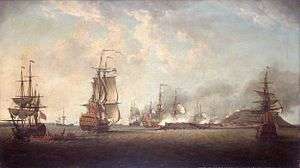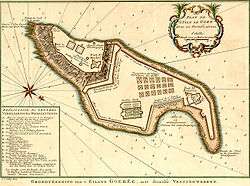Capture of Gorée
| Capture of Gorée | |||||||
|---|---|---|---|---|---|---|---|
| Part of Seven Years' War | |||||||
 Overview of the attack on Gorée by Dominic Serres | |||||||
| |||||||
| Belligerents | |||||||
|
|
| ||||||
| Commanders and leaders | |||||||
|
|
| ||||||
| Strength | |||||||
|
11 ships 1 regiment & two companies of foot | 1 fortress with 300 troops | ||||||
| Casualties and losses | |||||||
| Light | 300 captured | ||||||

Gorée and its fortifications
The Capture of Gorée occurred in December 1758 when a British naval expedition led by Augustus Keppel against the French island of Gorée off the coast of Senegal during the Seven Years' War.[1]
Keppel bombarded the fortress and then landed his marines to take possession. The French Blaise Estoupan de Saint-Jean surrendered the fortress and the island. The garrison (about 300 men) and many Africans became prisoners of war and 110 guns and mortars were captured.[2]
The island was occupied by the British until 1763 when it was returned following the Treaty of Paris.
References
- ↑ McLynn p.99-100
- ↑ "1758 - British expedition against Gorée in Senegal". Kronoskaf. Retrieved 18 May 2014.
Bibliography
- Anderson, Fred. Crucible of War: The Seven Years' War and the fate of Empire in British North America, 1754-1766. Faber and Faber, 2000.
- Brown, Peter Douglas. William Pitt, Earl of Chatham: The Great Commoner. George Allen & Unwin, 1978.
- Dull, Jonathan R. The French Navy and the Seven Years' War. University of Nebraska, 2005.
- McLynn, Frank. 1759: The Year Britain Became Master of the World. Pimlico, 2005.
- Simms, Brendan. Three Victories and a Defeat: The Rise and Fall of the First British Empire. Penguin Books (2008)
Coordinates: 14°40′01″N 17°23′54″W / 14.6669°N 17.3983°W
This article is issued from
Wikipedia.
The text is licensed under Creative Commons - Attribution - Sharealike.
Additional terms may apply for the media files.